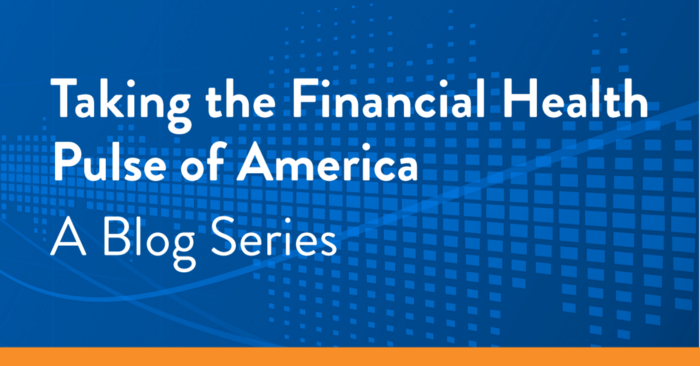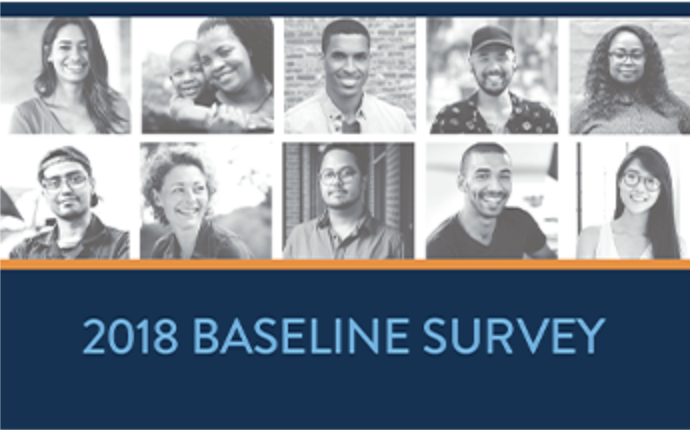TEST Exclusive Reports
Industry
Benefits
Member benefits
What We Know to Be True: Making Informed Benefits Decisions in Uncertain Times
During a pandemic, unexpected expenses or unplanned loss of income can have a devastating impact on a household’s day-to-day financial management. Employers have an opportunity to steward their resources more effectively into responsive and informed investments to aid employees’ long-term financial health.
PayPal and JUST Capital Launch New Collaborative Initiative
Learn about this new initiative, which calls on the C-suite to prioritize financial security for employees.
Race, Ethnicity, and the Financial Lives of Young Adults
Young adults of color, particularly those who are Black and Latinx, have borne a disproportionate share of economic hardship, as decades of systemic racism have made their communities more vulnerable to the effects of these crises.
Beyond Messaging: Financial Health Is No Longer a Nice-To-Have
We’ve long known from research and practice about the business case for advancing financial health. The coronavirus escalated the already precarious state of financial health of Americans everywhere and Financial Health Network Members took notice.
Policy Perspective: Supporting Consumers in a Financial Health Crisis
Author: Dan Murphy One striking feature of the Covid-19 economic crisis is just how different it is from our most recent financial crisis. While the subprime mortgage crisis began with an immediate shock to financial markets, the economic crisis brought about by this pandemic began with an immediate shock to public health that quickly impacted…
The Complexities of Caregiving: Financial Health and the Aging Crisis
Research overwhelmingly shows that health shocks can have dramatic and long-term implications for financial health. This is especially true for the elderly. Among all the statistics, it is clear that there will be more elderly people dependent on fewer younger people with an ever-increasing list of challenges, making financial health for all less attainable.
New Pulse Data: Those Who Need COVID-19 Stimulus Most Are the Last to Get It
By David Silberman, Senior Advisor, Financial Health Network The COVID-19 pandemic has caused widespread economic dislocation. Tens of millions of Americans have lost their jobs, at least temporarily, and millions more have seen their hours drastically cut. Those job and wage losses have fallen disproportionately on low-wage workers, especially blacks and Latinos, who are concentrated…
Edquity Case Study: Supporting Students with Innovative Emergency Aid
Each year, millions of college students struggle to stay in school not because of academic difficulties, but because of financial challenges. The Financial Health Network is dedicated to furthering solutions to help improve student financial health and increase academic success. In this case study, we explore how Edquity – an innovative student support app – is working to reduce the number of students who dropout of college because of a financial emergency of $500 or less.
Webinar: The Role of Trust in the Financial Data Ecosystem
During this webinar, attendees heard from a leading financial technology company about the importance of being a trusted steward of consumers’ data and discussed what good data governance means for consumer financial health
Restoring Lost Tools, Reframing “Consumer Choice”
How do we open up our industry’s mindset and encourage banks to restore choice to consumers who want to retake control over their own financial behavior? I have two modest proposals for banks and credit unions to adopt the retronovations as part of their account offerings.
Supporting Financial Health for Millennials and Women in the Workplace
Millennials and women have unique financial needs. This report sheds light on the needs and preferences of these employees, helping employers develop targeted solutions that can set them apart in a competitive marketplace.
The Case for Employers to Invest in Employee Financial Health
Employees at mid- to large-sized companies struggle with many aspects of their financial lives, causing them stress and creating spillover effects on job productivity, according to a new survey of 1,000 employees. In this infographic, Financial Health Network reveals key survey findings and opportunities for employers.
#FinHealthMatters Day should be every day, for everyone
In recognition of #FinHealthMatters Day, we reflect on our efforts to advance the cause of financial health which include research and building partnerships with leading organizations and our network of Members.
Financial Health and Higher Education: The Power of Assessing Student Financial Health
There is increasing awareness among community colleges and universities regarding the link between student financial health and academic success. In 2018, working closely with a cohort of innovative colleges and universities, Financial Health Network developed a new, holistic framework for not only understanding, but also assessing and measuring student financial health.
Financial Retronovation #2: Resurrecting the check register…with an AI assist
Imagine going to your smart phone to view your checking balance and seeing two numbers instead of one. The first number is the traditional available balance. The second is an estimate –more often than not, a smaller number — that projects what your balance will be one, two or three days from now.
Comment Letter: Small-Dollar Lending
The Center for Financial Services Innovation responds to the FDIC’s Request for Information on Small-Dollar Lending based on our research into the consumer behaviors, products, and providers that comprise the market for small-dollar credit.
2019 Member Kit
Announce your membership publicly and internally using the Press Kit, learn about member-only research and events.
A Sharing of Ideas: How cross-country exchanges can foster innovation
Recently, Financial Health Network and MetLife Foundation hosted five social entrepreneurs from South Korea to exchange ideas and learnings with U.S. nonprofits, social enterprises, impact investors and financial health fintech companies. There were three main themes that made an impact on the South Korean social entrepreneurs.
Technology is Making Parking Tickets Obsolete. Are Overdrafts Next?
Frequent debit card use makes it difficult to keep a diligent check register that accounts for pending payments. Behaviorally informed personal finance apps and smart checking account features have already begun to remove some of the uncertainties posed by recurring cash management challenges, just as smart meters have taken much of the gambling out of parking.
3 Factors that Shape Financial Health in America
By Thea Garon Director, Financial Health Network Despite a surging stock market and record-low unemployment, millions of Americans are struggling financially. Nearly half of Americans (47%) say their spending equaled or exceeded their income in the last year. One in three people (30%) say they have more debt than is manageable. More than a third…
U.S. Financial Health Pulse: 2018 Baseline Survey Results
In this initial study, the Financial Health Network reveals how we’re faring financially and the trends shaping our financial health.
Homeowners and Renters Insurance Spotlight
This brief takes a closer look at the homeowners and renters insurance coverage, acquisition channels, knowledge, and claims experience of American consumers, with a particular focus on low- to moderate-income (LMI) consumers.
Disability Insurance Spotlight
To show how disability insurance can augment financial resilience, this brief examines short- and long-term disability insurance coverage, acquisition channels, and knowledge of American consumers, with a focus on LMI consumers.
Insurtech for Financial Health
Explore three major insurtech advances that could help more Americans weather financial shocks successfully, as well as potential pitfalls for insurers working to align business incentives with customer needs.
Making Payroll Cards Work for Employees
An in-depth look at employee payroll card usage and opportunities for improvement in card design and delivery.
2018 Financial Health Leaders Spotlight: Servus Credit Union
Listen in as we hear how Servus Credit Union is working to embed its noble purpose of shaping member financial fitness into all areas of the credit union by using a series of purpose-driven outcomes for both the credit union and its members.
Dispatch from D.C. March 2018
In our first 2018 edition of Dispatch from D.C., listen in as Jennifer Tescher, the Financial Health Network President and CEO, interviews Jeanne Hogarth, the Financial Health Network’s recently retired VP of Policy.
Financial Solutions Lab Impact Report
The Financial Solutions Lab Impact Report outlines how the Lab’s model has performed in positively impacting companies, the market, and ultimately, consumers’ financial health.
Case Study: A Walk In Their Shoes: Improving Financial Health Solutions Through Empathy-Led Learning
Regions Bank participated in FinX to gain insights through first-hand experiences of the challenges that underserved consumers may face in an interactive, real-world structure.
Tools to Provide a Prescription for Financial Health
Learn how Envestnet | Yodlee is using data analytics to build tools companies can use to provide consumers with a prescription for improving their financial health.
Secured Credit Cards: Rural, Underserved Communities
Americans in rural communities are losing access to locally available, affordable financial services and products.
Secured Credit Cards: Establishing a Path for New Immigrants
Secured credit cards can be an effective way to build U.S. credit history and thereby access affordable credit products and fully benefit from inclusion in the U.S. financial system.
Global Financial Health Framework
This paper expands upon the Financial Health Network's initial financial health research and applies it to a global setting.
Driving for Broke: The Underserved Insurance and Auto Loan Opportunity
In the United States, there are approximately 198 million insured vehicles on the road today. Among those, approximately 53 million vehicles are insured by low- to moderate-income (LMI) — often known as underserved — consumers.
The Financial Health Network Comment Letter on OCC Responsible Innovation Whitepaper
The Financial Health Network recognizes the important role that access to high-quality financial products plays in helping consumers improve and maintain their financial health.
Dispatch from D.C. — March 2016 — Executive Summary
Working Paper: Income Gains And Month-To-Month Income Volatility
A working paper from the U.S. Financial Diaries on income gains and month-to-month income volatility.
Designing for Financial Health: Stories and profiles from the Financial Capability Innovation Funds
We can educate consumers and provide access to financial products and services. But how do we help consumers use their knowledge and tools to improve their financial behavior and become financially healthy?
Case Study: Learning Consumers’ Struggles By Walking in Their Shoes with USAID and U.S. Treasury Department
USAID and the U.S. Treasury Department hosted a FinX, an in-the-field opportunity that puts participants in consumers’ shoes and has them tackle the challenges they face head-on.
Coming Up Short Infographic
Over 100 million Americans encounter difficulty managing their household cashflow. This infographic illustrates some of the challenges these households face and describes how the Financial Solutions Lab can help to improve their financial health.
Financial Solutions Lab Snapshot: Solutions to Manage Household Cash Flow
Over the last year, more than 100 million American households experienced a financial shock. This year the Financial Solutions Lab’s second $3 million challenge was seeking solutions that could help Americans to weather such shocks.
The Financially Tenuous, a Consumer Financial Health Segment
More than half of Americans in the tenuous segment live paycheck to paycheck (53%) and struggle to keep up with bills and credit payments.
Mateo And Lucia Household Profile: Thriving But Still Vulnerable In The U.S.
U.S. Financial Diaries Case study: Mateo Valencia, 31, and Lucia Benitez, 30, are an unmarried couple living in Queens with their four year-old son Pablo.

































